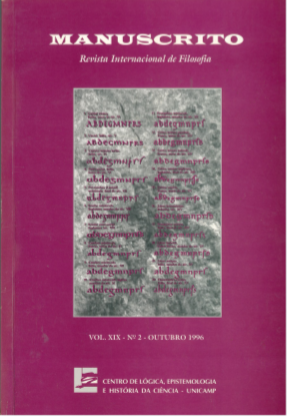Resumo
Incommensurability is a famous and polemical term in contemporary epistemology and philosophy of science. In this article the evolution the notion of incommensurability in the thought of Thomas Kuhn is briefly reconstructed. Its metaphorical character is underlined and some misunderstandings are corrected. We also emphasize the fertility of this metaphor through presenting some theoretical developments and by suggesting its utility for understanding non-orthodox points of view in the social sciences.
Referências
Bloor, D. (1983). Wittgenstein: A Social Theory of Knowledge, (London, Macmillan).
Bunge, M. (1980). Epistemologia. (São Paulo, Queiros-EDUSP).
Biagioli, M. (1989). The Anthropology of Inconmmensurability. Stud. Hist. Phil. Sci. 21 (2): 183-209.
Douglas, M. (1966). Purity and Danger, (London, Macmillan).
Douglas, M. (1970). Natural Symbols, (London, Barrie & Jenkins).
Douglas, M. (1978). Cultural Bias, Occasional Paper n. 34 of the Royal Anthropological Institute of Great Britain and Ireland.
Feyerabend, P. (1962). Explanation, Reduction and Empiricism, in Feyerabend (1981), pp. 44-96.
Feyerabend, P. (1975). Against Method. (London, Verso.)
Feyerabend, P. (1981). Philosophical Papers I (Cambridge, Cambridge University Press).
Finocchiaro, M. (1980). Galileo and the Art of Reasoning: Rhetorical Foundations of Logic and Scientific Method (Dordrecht, Reidel).
Gross, A. (1990). The Rhetoric of Science (London & Cambridge MA., Harvard University Press).
Hoyningen-Huene, P. (1993). Reconstructing Scientific Revolutions: Th. S. Kuhn's Philosophy of Science (trad. do orig. alemão de 1989). (Chicago/London, The University of ChicagoPress).
Kruger, L., Datson, L., & Heildelberg, M. (eds.) (1990). The Probabilistic Revolution. (Cambridge Mass. and London, MIT Press.)
Kuhn, T.S. (1970a). The Structure of Scientific Revolutions 2nd ed. (orig. 1962). (Chicago, The University of Chicago Press).
Kuhn, T.S. (1970b). Postscript, in Kuhn (1970a), pp. 174-210.
Kuhn, T.S. (1970c). Reflections on my critics, in Lakatos, I. & Musgrave, A. (eds.) (1970), pp. 231-278.
Kuhn, T.S. (1974). Second Thoughts on Paradigms, in Kuhn (1977a).
Kuhn, T.S. (1977a). The Essential Tension. (Chicago, The University of Chicago Press).
Kuhn, T.S. (1977b). Objectivity, Value Judgement and Theory Choice, in Kuhn (1977a), pp. 320-339.
Kuhn, T.S. (1981). What are Scientific Revolutions?, in Kruger, L., Daston, L. and Heildelberg, M. (eds.) (1990).
Kuhn, T.S. (1983). Commensurability, Comparability, Comunicability, in: PSA 1982, ed. by P. Asquith & Th. Nickles. (East Lansing, PSA), pp. 669-688.
Lakatos, I. (1976). Proofs and Refutations (London, Cambridge University Press).
Lakatos, I.. & Musgrave, A. (eds.) (1970). Criticism and the Growth of Knowledge. (London, Cambridge University Press).
Margolis, H. (1987). Patterns, Thinking and Cognition. (Chicago & London, University of Chicago Press).
Margolis, H. (1993). Paradigms and Barriers: How Habits of Mind Govern Scientific Beliefs. (Chicago & London, The University of Chicago Press).
Newton-Smith, W.H. (1981). The Rationality of Science. (Boston, London, Routledge & Kegan Paul).
Pera, M. (1994). The Discourses of Science, (Chicago, University of Chicago Press).
Pera, M. & Shea, W. (1991). Persuading Science: The Art of Scientific Rhetoric (Science History Publications).
Popper, K. (1968) (orig. 1962). Conjectures and Refutations. (New York, Harper & Row).
Popper, K (1972). Le Mythe du Cadre de Reference (trad. de "The Myth of the Framework"), in Colloque de Cerisy (1989) Karl Popper et la science d'aujourd'hui. (Paris, Aubier), pp. 13-44.
Putnam, H. (1981). Reason, Truth and History. (Cambridge, Cambridge University Press).
Prelli, L. (1989). A Rhetoric of Science: Inventing Scientific Discourse. (Columbia, University of South Carolina Press).
Shapere, D. (1969). Notes Toward a Post-Positivistic Interpretation of Science, in Shapere (1984).
Shapere, D. (1984). Reason and the Search for Knowledge. (Dordrecht, Reidel).
Sheffler, I. (1982), (orig. 1967). Science and Subjectivity. (Indianapolis-Cambridge, Hackett Publishing Company.).
Thagard, P. (1987). Computational Philosophy of Science, (Cambridge MA., MIT Press).
Thagard, P. (1993). Conceptual Revolutions. (Princeton NJ, Princeton University Press).
Watkins, J.W. (1970). Against “Normal Science”, in Lakatos, I. & Musgrave, A. (eds.) (1970), pp. 25-37.
Weimer, W. (1977). Science as a Rhetorical Transaction, Philosophy and Rhetoric, v. 10, pp. 1-19.

Este trabalho está licenciado sob uma licença Creative Commons Attribution 4.0 International License.
Copyright (c) 1996 Manuscrito: Revista Internacional de Filosofia


